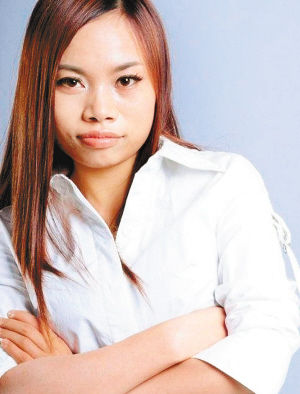 |
|
Luo Yufeng, better known as Sister Feng, poses with a passersby in Guangzhou during her marriage-seeking trip around the country in this undated file photo.?[Photo/China Daily] |
Luo Yufeng first gained online notoriety as an air-headed, homely twenty-something who unaccountably demanded China's most eligible bachelors despite not being well-qualified herself. Now, the controversial online celebrity has been hired by a respected news app as a columnist.
Luo shot to fame when she declared herself "the most intelligent human being in the past three centuries" and demanded a husband who "must be an elite with a degree in economics or similar from Peking University or Tsinghua University" and "must also be 176 to 183 centimeters tall and good looking".
These blunt remarks attracted relentless mockery and over 4.9 million followers on Sino Weibo, China's equivalent of Twitter, as this self-styled "intellectual" revealed further details, such as the fact that her main reading material was Zhi Yin and Gushihui, two lowbrow publications at the level of Reader's Digest, and certainly not serious publications such as Forbes or the Economist.
It also earned her the nickname "Sister Feng", which later became a byword for a silly, presumptuous attitude.
That was back in 2009. Now, the controversial young woman has reinvented herself, with a deal from a respected Chinese news app to become a columnist.
News app ifeng, one of the most influential of its kind among Chinese readers, announced the partnership on Wednesday, saying "Luo's straightforward style will offer a different perspective to readers."
Luo talked about online controversy, a topic she has been intimately familiar with in the last six years, citing Chinese actresses and singers in her debut column.
In stark contrast to her absurdly arrogant speech in 2009, the rookie columnist made a plea for tolerance in the column, with its unexpectedly humble tone.
The transition from an object of contempt to a columnist of a serious news app seems to have gained her supporters among the public, who left many supportive comments on her post on Weibo.
 |
|
News app ifeng attaches this profile photo in the announcement?that?Luo Yufeng?has been hired as a columnist. [Photo/Weibo.com] |
Weibo user Yusuier lauded Luo's positive spirit. "I think she's a strong person. Born into a single-parent family, she keeps going on regardless of the contempt of her peers. Plus she has to take care of her aging mother and younger siblings."
The change, however, didn't happen overnight.
After living under online censure for two years since 2009, Luo moved to New York City in 2011. Little is known about how she got a US visa.
The new immigrant became a manicurist to make ends meet and gradually moved out of the public spotlight.
Luo came back into the public eye in May when she opened up to the Chinese version of the New York Times about her life in New York and her experience of working in different nail salons.
Luo was one of the interviewees who revealed the harsh, racist, and harmful working conditions as part of the newspaper's investigative report on the dark side of the sprawling business in New York.
The report gained sympathy for the hard worker, marking the first step of reconciliation between the once-hated attention-seeker and the public.
However, controversy continues to dog Luo, as it has followed her ever since she stepped into the spotlight.
Given that reading habits can give a glimpse into one's intellectual ability, it's come as no surprise that many have expressed doubts that someone who consumes lowbrow magazines has now been named a columnist, a job normally reserved for well-recognized, knowledgeable people with good educational backgrounds.
Luo went to a little known junior college in Southwest China's Chongqing. She doesn't even have a bachelor's degree.
In defense of the news app's decision, which skeptics called a bid for publicity, Wang Lu, an editor who helped to refine Luo's first published article, said she retained much of the original writing and only added two sentences.
Luo's writing "had a genuine voice", said the editor in a public account she runs on Wechat, a popular mobile instant communication app in China.
The news app's statement addressed Luo as Ms Luo Yufeng instead of the derogatory Sister Feng, and Luo's profile photo on the app projects the aspirational image of a professional working woman.
